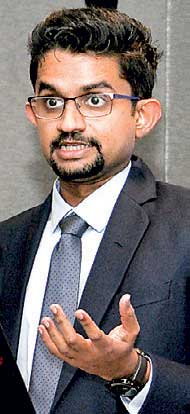Sunday Feb 22, 2026
Sunday Feb 22, 2026
Thursday, 1 February 2018 00:08 - - {{hitsCtrl.values.hits}}
By Charumini de Silva
With a major election coming up in 2020, a top economist insisted that it was critical to maintain the economic stability created in 2017, cautioning that there was limited time in getting much-needed reforms through.
 “If politics overrides the stability that the economy has created during last year, Sri Lanka will not be able to get the economy further as we will not be able to create the financial buffer the economy needs to have by next year to repay debt till 2021,”said Ceylon Chamber of Commerce Chief Economist Shiran Fernando.
“If politics overrides the stability that the economy has created during last year, Sri Lanka will not be able to get the economy further as we will not be able to create the financial buffer the economy needs to have by next year to repay debt till 2021,”said Ceylon Chamber of Commerce Chief Economist Shiran Fernando.
Making a presentation on the economic outlook for 2018 at the Chartered Institute of Marketing (CIM) Sri Lanka’s first Talking Point program for this year, he asserted that the next 10 days’ time would be crucial as the noise that leads to the local government elections and any fallout from that could have a major impact on the momentum of the reform process.
In terms of foreign debt servicing requirements, he emphasised that 2018 was a year where the country could create a buffer to face headwinds in 2019-2021.
Fernando pointed out that dependency on construction and financial services has continued from 2016 and it was likely to continue this year too as construction and financial services remain the top two contributors to economic development. Apart from these two sectors, he said real estate and transport had grown considerably.
“We have not realigned or moved on to a more export-oriented economy or towards more tradable investments as yet. This is one of the main reasons why we are not seeing a 5%-6% growth in the economy. We are still in that shifting phase, which is why it is critical to build on the economic stability we have seen in 2017,” he explained.
He acknowledged that the $1.63 billion in foreign direct investments (FDIs) augured well for economic development this year. However,he stressed that it was unsatisfactory compared to other economies in the region noting that there was more room for improvement in the sector.
“Since Sri Lanka does not get enough FDIs as the economy should, we need to go for commercial debt, which exposes us to risks in the global capital markets. However, from February last year, there was a healthy stream of inflows particularly from portfolio investors buying into Sri Lanka’s T-bills and T-bonds. Notably during this period the rupee was stable as well,” he added.
Considering the sensitivity towards the external market, he said portfolio investment did matter and expectedthat the upward trend in both FDI inflows and portfolio investments would grow this year too.
“Going to 2018, what matters is that this positive trend will continue,” he stated.
He said that with the US elections coming up, it was interesting to see how it was going to impact the economy, adding that last year the rupee depreciated only about 2% compared to 10% seen with the US dollar, which offered key support for Sri Lanka.
However,Fernando said that while policy happens at one end, there is an opportunity for businesses to get into new avenues and to plan according to the reforms.